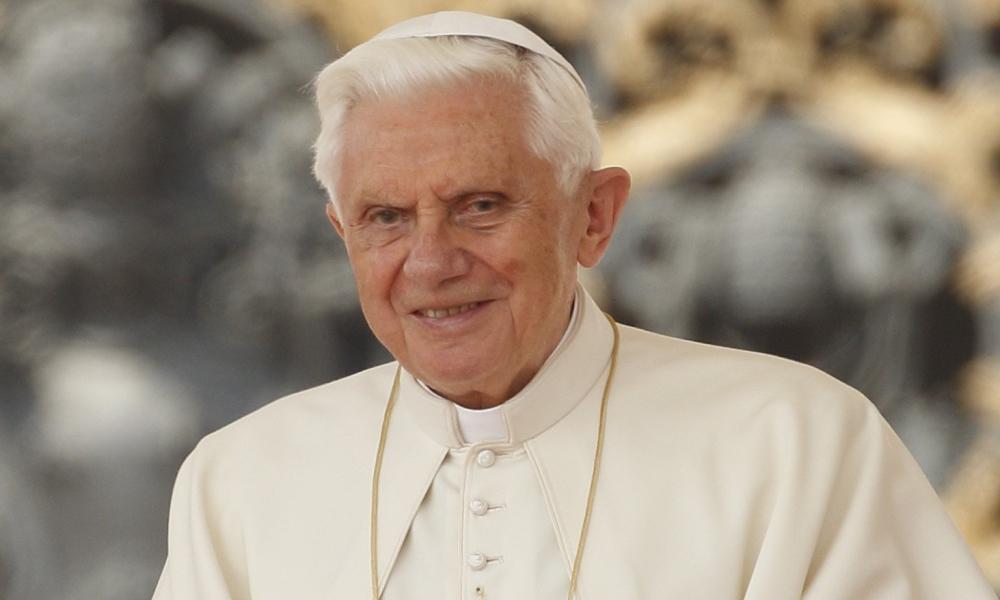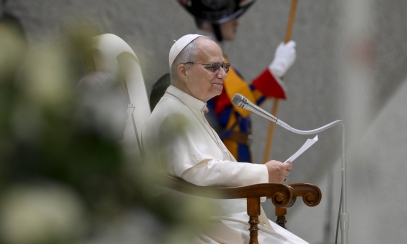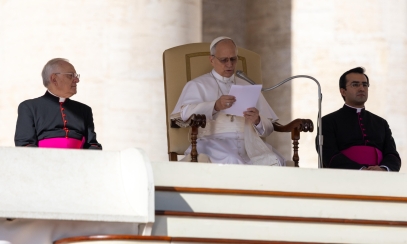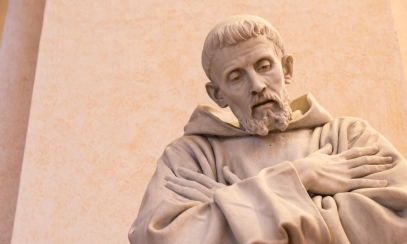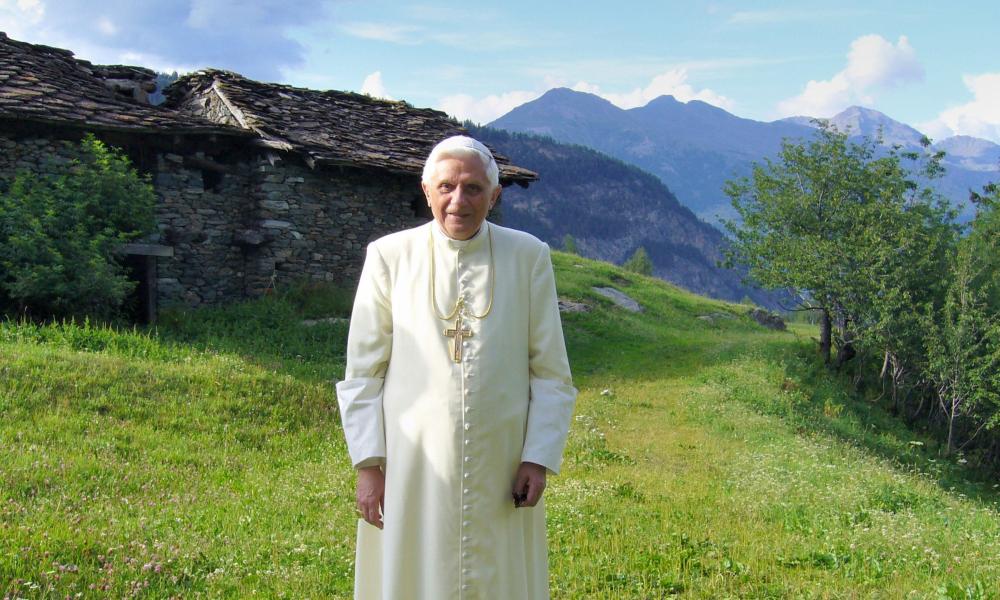
Church leaders remember Pope Benedict with gratitude
From Bishop Gregory Parkes-
With sadness, we mourn the loss of Pope Emeritus Benedict XVI, and with gratitude give thanks for his many years of service and ministry to the Church. He was a humble servant who faithfully accepted and fulfilled God’s will for his life. His theological intellect and spiritual wisdom will certainly be missed. May this humble worker in the vineyard of the Lord now rest in the peace of God’s loving and merciful arms.
Click to view/download holy card created by the Diocese of St. Petersburg for Pope Emeritus Benedict XVI: PNG Side One, PNG Side Two, PDF
By Cindy Wooden, OSV News
VATICAN CITY (CNS) — Catholic leaders around the world who had been praying for retired Pope Benedict XVI reacted with sorrow to news of his death Dec. 31 but expressed gratitude for his years of service to the Catholic Church as a theologian and pope.
Archbishop Timothy P. Broglio, president of the U.S. Conference of Catholic Bishops, who had known then-Cardinal Joseph Ratzinger when they both worked in the Roman Curia, said in a statement, “While we grieve that he is no longer with us here, I join Catholics everywhere in offering my profound gratitude to the Lord for the gift of Pope Benedict XVI and his ministry.”
“As a priest, university professor and theologian, archbishop and cardinal, his voice in deepening an authentic understanding” of the faith “led all of us to a more profound love of truth and the mystery of God,” the archbishop said. “It will take many years for us to delve more deeply into the wealth of learning that he has left us.”
The night before retired Pope Benedict XVI died, thousands of people had joined Cardinal Angelo De Donatis, papal vicar for Rome, in praying for the ailing pope, the former bishop of Rome, in the Basilica of St. John Lateran.
In his homily, the cardinal said that “even in old age and illness, Pope Benedict continues to sustain humanity” with his prayers, and “in deep communion with Pope Francis, the pope emeritus is a sign of the beautiful face of the church that reflects the light of the face of Christ.”
“As a priest, theologian, bishop and pope,” the cardinal said, he always “expressed the strength and sweetness of the faith with essentiality and simplicity.”
Canadian Cardinal Thomas Collins of Toronto said in a statement Dec. 31, “As a priest for more than 70 years and in his time as bishop and supreme pontiff, Pope Emeritus Benedict offered each one of us a personal example of fidelity and of what it is to be a devoted disciple of Jesus.”
“As a theologian, he followed in the footsteps of the great St. Augustine in offering to us profound insight into the mysteries of our Christian faith, insight arising by God’s grace not only from his astonishing intellect and learning, but also from his personal holiness and pastoral care for God’s people,” Cardinal Collins continued. “His writings will help guide disciples of Jesus in the centuries that lie before us.”
Cardinal Christoph Schonborn, who studied with the former Father Joseph Ratzinger and worked with him in drafting the Catechism of the Catholic Church, tweeted: “It is with great gratitude that I think of Pope Benedict, with whom I was associated for decades. He was a companion and role model for me as a theologian, priest and bishop. Now he may experience in fullness the friendship of Jesus that he proclaimed.”
Archbishop Vincenzo Paglia, president of the Pontifical Academy for Life, said he and the members share “in the church’s grief over the death of Pope Emeritus Benedict XVI,” who will be remembered “as one of the most influential theologians of the 20th century, constantly striving to make the faith understandable and trustworthy for modern men and women.”
Jesuit Father Federico Lombardi, president of the Joseph Ratzinger-Benedict XVI Vatican Foundation, said that while the last public event Pope Benedict participated in was a 2016 celebration at the Vatican for his 65th anniversary of priesthood, Pope Francis and other friends and visitors continued to meet with him, and images would circulate on social media “so that we continued to feel accompanied by his discreet but vigilant presence.”
Sometimes, Father Lombardi said, the retired pope would reply to letters or send brief messages, “from which his kindness and the sharpness and intensity of his spiritual presence invariably shone through.”
Summarizing the late pope’s life in the Jesuit journal La Civiltà Cattolica, Father Lombardi wrote, “The horizons of Ratzinger’s thought and ecclesial service expanded over eight decades from his native Bavaria to the ends of the earth, then his gaze focused on the fascinating and mysterious face of Jesus,” up to the moment of his own “encounter” with the Lord.
“The legacy he leaves us is that characteristic of a theologian called to the See of Peter, who confirmed his brothers in the faith through teaching, sacramental service and the testimony of his life,” Father Lombardi wrote.
U.S. Cardinal Seán P. O’Malley of Boston also commented on Pope Benedict’s “deep and abiding faith and extraordinary record of theological scholarship.”
Cardinal O’Malley was present in Washington in 2008 when Pope Benedict met with survivors of clerical sexual abuse and “recognized the pain experienced by survivors and all persons impacted by the abuse crisis,” he said. “He was then, and at all times remained, committed to the church supporting their journey toward healing and doing all that was possible to ensure the protection of children, young people and vulnerable adults.”
Bishop Hugh Gilbert of Aberdeen, president of the Scottish bishop’s conference, particularly remembered Pope Benedict’s visit to Scotland in 2010. “The gentle and prayerful intelligence revealed during that visit disarmed his critics. He was often misunderstood, even caricatured.”
“Contrary to a widespread perception, however,” the bishop said, “he was a resolutely contemporary ‘confessor of the faith,’ deeply and critically engaged with modern thought, a lucid and unacademic preacher and pastorally sensitive.”

